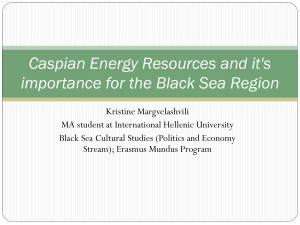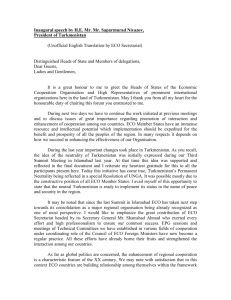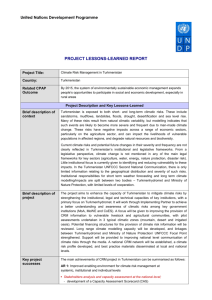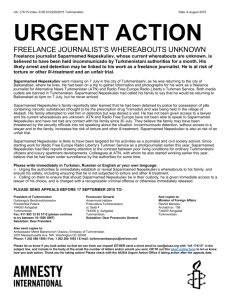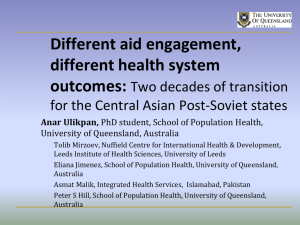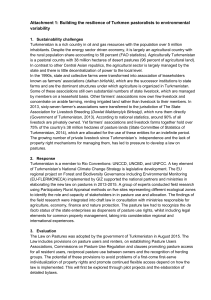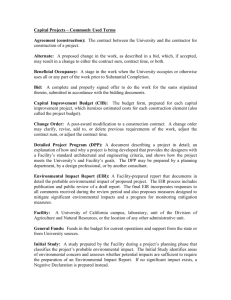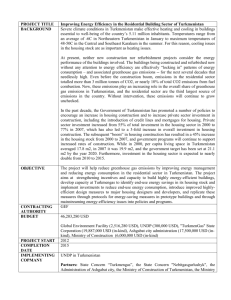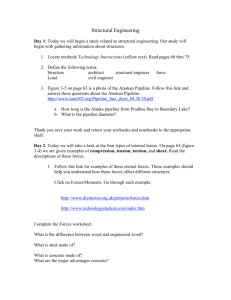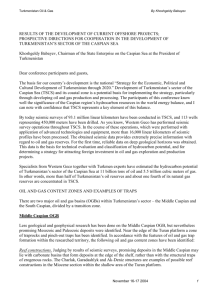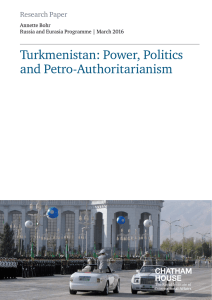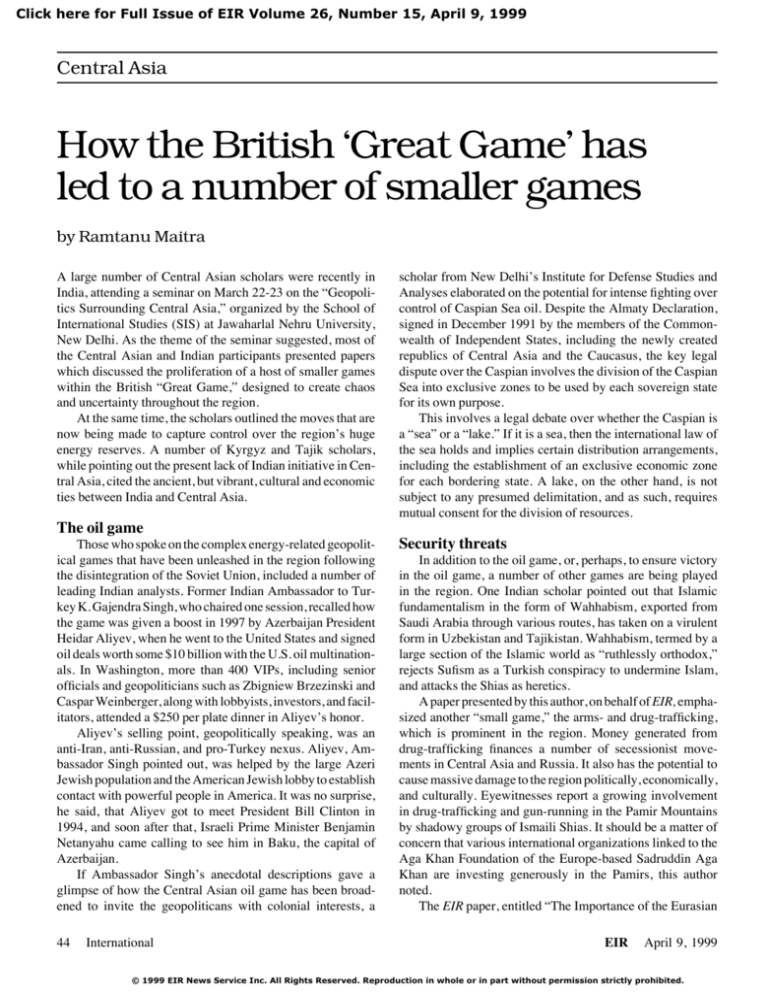
Click here for Full Issue of EIR Volume 26, Number 15, April 9, 1999
Central Asia
How the British ‘Great Game’ has
led to a number of smaller games
by Ramtanu Maitra
A large number of Central Asian scholars were recently in
India, attending a seminar on March 22-23 on the “Geopolitics Surrounding Central Asia,” organized by the School of
International Studies (SIS) at Jawaharlal Nehru University,
New Delhi. As the theme of the seminar suggested, most of
the Central Asian and Indian participants presented papers
which discussed the proliferation of a host of smaller games
within the British “Great Game,” designed to create chaos
and uncertainty throughout the region.
At the same time, the scholars outlined the moves that are
now being made to capture control over the region’s huge
energy reserves. A number of Kyrgyz and Tajik scholars,
while pointing out the present lack of Indian initiative in Central Asia, cited the ancient, but vibrant, cultural and economic
ties between India and Central Asia.
The oil game
Those who spoke on the complex energy-related geopolitical games that have been unleashed in the region following
the disintegration of the Soviet Union, included a number of
leading Indian analysts. Former Indian Ambassador to Turkey K. Gajendra Singh, who chaired one session, recalled how
the game was given a boost in 1997 by Azerbaijan President
Heidar Aliyev, when he went to the United States and signed
oil deals worth some $10 billion with the U.S. oil multinationals. In Washington, more than 400 VIPs, including senior
officials and geopoliticians such as Zbigniew Brzezinski and
Caspar Weinberger, along with lobbyists, investors, and facilitators, attended a $250 per plate dinner in Aliyev’s honor.
Aliyev’s selling point, geopolitically speaking, was an
anti-Iran, anti-Russian, and pro-Turkey nexus. Aliyev, Ambassador Singh pointed out, was helped by the large Azeri
Jewish population and the American Jewish lobby to establish
contact with powerful people in America. It was no surprise,
he said, that Aliyev got to meet President Bill Clinton in
1994, and soon after that, Israeli Prime Minister Benjamin
Netanyahu came calling to see him in Baku, the capital of
Azerbaijan.
If Ambassador Singh’s anecdotal descriptions gave a
glimpse of how the Central Asian oil game has been broadened to invite the geopoliticans with colonial interests, a
44
International
scholar from New Delhi’s Institute for Defense Studies and
Analyses elaborated on the potential for intense fighting over
control of Caspian Sea oil. Despite the Almaty Declaration,
signed in December 1991 by the members of the Commonwealth of Independent States, including the newly created
republics of Central Asia and the Caucasus, the key legal
dispute over the Caspian involves the division of the Caspian
Sea into exclusive zones to be used by each sovereign state
for its own purpose.
This involves a legal debate over whether the Caspian is
a “sea” or a “lake.” If it is a sea, then the international law of
the sea holds and implies certain distribution arrangements,
including the establishment of an exclusive economic zone
for each bordering state. A lake, on the other hand, is not
subject to any presumed delimitation, and as such, requires
mutual consent for the division of resources.
Security threats
In addition to the oil game, or, perhaps, to ensure victory
in the oil game, a number of other games are being played
in the region. One Indian scholar pointed out that Islamic
fundamentalism in the form of Wahhabism, exported from
Saudi Arabia through various routes, has taken on a virulent
form in Uzbekistan and Tajikistan. Wahhabism, termed by a
large section of the Islamic world as “ruthlessly orthodox,”
rejects Sufism as a Turkish conspiracy to undermine Islam,
and attacks the Shias as heretics.
A paper presented by this author, on behalf of EIR, emphasized another “small game,” the arms- and drug-trafficking,
which is prominent in the region. Money generated from
drug-trafficking finances a number of secessionist movements in Central Asia and Russia. It also has the potential to
cause massive damage to the region politically, economically,
and culturally. Eyewitnesses report a growing involvement
in drug-trafficking and gun-running in the Pamir Mountains
by shadowy groups of Ismaili Shias. It should be a matter of
concern that various international organizations linked to the
Aga Khan Foundation of the Europe-based Sadruddin Aga
Khan are investing generously in the Pamirs, this author
noted.
The EIR paper, entitled “The Importance of the Eurasian
EIR
April 9, 1999
© 1999 EIR News Service Inc. All Rights Reserved. Reproduction in whole or in part without permission strictly prohibited.
Land-Bridge for Central Asian Development,” pointed out
that the stakes in Central Asia are large for all major nations
adjacent to it, including Russia, China, India, Pakistan, and
Iran, and that time is running out fast. Unless the major nations
quickly evaluate the security and strategic situation in the
region and come to a constructive arrangement for economic
development, there is a great likelihood that the “small
games” played upon economically and politically weak nations may turn the whole of Central Asia into a large Afghanistan, where problems breed at a much faster rate than solutions.
What Central Asia needs
This author pointed out that Central Asian leaders, and
those of the major nations surrounding it, must understand
that so long as the Central Asian nations are viewed as suppliers of important raw materials, the Great Game can spawn a
whole range of small games, keeping the region in a constant
state of chaos.
The key to establishing stability and economic development is in identifying the agro-industrial potential of the Central Asian nations and utilizing the vast energy and abundant
material resources to reach that goal. An all-round agro-industrial development program for these countries would ensure
development of transportation, communications, and human
and water resources. These developments, if taken hand-inhand with the establishment of industries for processing of
raw materials and production of capital goods and basic consumer goods, would make Central Asian society stable and
sustainable, the EIR paper stressed.
This author pointed out yet another area which the scholars tend to ignore, namely, the financial globalization that the
Central Asian nations are presently undergoing. As a result,
the financial institutions in the region have remained very
weak and are falling under the influence of foreign bankers
and speculators.
Having gotten rid of the “birthmarks of socialism”—the
nationalized banking system—the Central Asian nations,
Kyrgyzstan in particular, opened their new financial systems
and they immediately went bust. Out of 20 commercial banks
functioning in Kyrgyzstan, 12 have gone under. In Uzbekistan, where the banks are more solvent, the picture is not
reassuring. Uzbekistan has the largest number of representative offices of foreign banks in the region, and a number of
joint venture banks have cropped up as well. Deutsche Bank,
Chase Manhattan Bank, Malaybank, and 20 other foreign
banks are represented, ensuring Uzbekistan’s steady loss of
control over its finances and eliciting its pledge of faith in
financial globalization.
In a paper by SIS academic Prof. K. Warikoo, a note of
optimism was struck. Having recently visited Kyrgyzstan and
travelled a bit along the old Silk Road, he noted the growing
commerce and trade between Kyrgyzstan and China, and Kazakstan and China. Citing Askar Ch. Aitmatov, an adviser
to Kyrgyzstan President Askar Akayev, Warikoo said that
EIR
April 9, 1999
Kyrgyzstan is keen to overcome its landlocked situation by
opening multiple communications options with the outside
world through Russia and China.
Professor Warikoo also mentioned a number of positive
developments along the China-Kyrgyz border. Kyrgyzstan
has settled its inherited border dispute with China, and has
agreed not to allow Uighur secessionist activity within its
territory, while China has vowed not to allow any increase in
the number of Chinese immigrants into Kyrgyzstan. Warikoo
also described the increasing hustle and bustle along the Chinese-built sections of the Eurasian Land-Bridge, and positive
signs of economic achievement along the route.
New geopolitics
Painting a broader picture, Prof. Devendra Kaushik, former head of the Russian and East European Section of the
SIS, said in his paper that the classic form of geopolitics,
propounded by Rudolf Kjellen, Friedrich Ratzel, Alfred T.
Mahan, and Halford Mackinder, has once again raised its
ugly head in Central Asia. As a follower of these colonialist
political scientists, Zbigniew Brzezinski, in his book The
Grand Chessboard (see Feature in this issue, and Lyndon
H. LaRouche, Jr., “Mad Brzezinski’s Chessboard,” in last
week’s EIR), proposed a fragmentation of Russia into a confederative European Russia, while a Siberian Republic and a
Far Eastern Republic are to be managed in cooperation with
China and Japan. Azerbaijan, Turkmenistan, and Uzbekistan
are to be managed jointly in cooperation with Turkey and
possibly also Iran. Brzezinski moots that control over Central
Asia be in the hands of the United States, China, and Japan,
while NATO provides the overall umbrella.
Such geopolitical formulations, if brought to fruition,
Kaushik points out, would mean no end of trouble for Central
Asia and the Caspian area. He points out that for Central Asia,
its natural dependence should lie with Russia, China, and
India. Russia and China are neighbors, and both have enormous scientific and technological capabilities to change the
economic scene in Central Asia. India, which does not have
a direct land route with Central Asia, must try to build one
through eastern Ladkah and connect it to the Xinjiang-Tibet
highway.
Kaushik is optimistic that the geopoliticians of the likes
of Brzezinski can be out-maneuvered. He told the Central
Asian scholars that the weakness of classical geopolitics is
that it is based upon the theory that “political power in the
modern world rests upon a complex base of raw materials and
that no state can become or remain a great power without
secure access to huge quantities of mineral fuels and other
sources of energy, metallic ores, non-metallic chemicals,
etc.” This physiocratic analysis failed to anticipate modern
technological advances in discovering substitutes for rare
metals and important raw materials, Kaushik notes.
Sketching out the new mode of geopolitics, Kaushik said:
“As a highly dynamic transnational economy rapidly replaces
the state-centric classical geopolitics, fixed geographical conInternational
45
ditions and configurations like heartland/rimlands, lifelines,
choke-points, critical strategic zones, etc., hardly impinge
upon the policy and behavior of great powers engaged in
pursuit of hegemony.”
Interview: Chary Taganovich Kuliyev
Turkmenistan develops
its oil, gas resources
When the news of a pipeline deal between Turkmenistan and
several Western oil companies was announced, for a pipeline
under the Caspian Sea, through Azerbaijan, Georgia, and
into Turkey, it was hailed in some European and American
press as a geopolitical coup, whereby Turkmenistan had
“joined” the camp of the Brzezinski-led faction of geopoliticians, who seek to exploit Central Asia oil and gas for political
purposes. It was also said in this connection, that Turkmenistan’s agreements for pipeline and other economic cooperation with other states, such as Iran, Russia, etc., had thereby
been cancelled.
To set the record straight, EIR requested an interview
with the Ambassador of the Republic of Turkmenistan in
Bonn, Germany. His Excellency Mr. Chary Taganovich Kuliyev provided exhaustive clarification regarding this and related issues, in an interview with Muriel Mirak-Weissbach
in March.
EIR: What was decided about the natural gas pipeline on the
Caspian Sea floor, in the agreement reached between Turkmenistan and the American consortium PSG?
Kuliyev: On Feb. 19, 1999, the President of Turkmenistan,
Saparmurat Niyazov, and the chief executive director of PSG
corporation, Edward Smith, signed an agreement, under
which that firm became the charter sponsor of the trans-Caspian project, as well as a Project Memorandum. These documents mean that implementation of the trans-Caspian project
has entered a qualitatively new stage, initiating the formation
of the consortium that will build and commission the transCaspian pipeline.
This important event was welcomed, on behalf of the
American administration, by adviser to the President and to
the State Department for Caspian region energy development
Richard Morningstar, who noted, in particular, that the transCaspian project will enable Turkmenistan to exploit its energy
potential with maximum gain for itself, while marking its
integration into not only the regional, but the global energy
system. He also emphasized that this event is historic in the
46
International
context of strengthening bilateral relations between Turkmenistan and the U.S.A., and that the American government
will do everything in its power to continue to promote the
trans-Caspian project.
The trans-Caspian project is the first international project
of this scale to be carried out at the turn of the century. This
event was the result of efforts not only by Turkmenistan, but
also by our partners, particularly the U.S.A. and, above all,
U.S. President Bill Clinton and Vice President Albert Gore,
with whom President S.A. Niyazov discussed in detail all
the questions related to implementation of the trans-Caspian
project, during talks in Washington in April of last year.
In working to implement this project, Turkmenistan is
not playing political games, but is guided exclusively by its
national interests, insofar as it is impermissible for a country
that possesses 30% of the world’s reserves of hydrocarbon
[natural gas] raw materials to do nothing for the development
of pipeline infrastructure.
In response to concerns on the part of some countries in the
region, about the possible ecological impact of this project, it
will be subjected to international expert ecological analysis,
for which purpose the Turkmen side has proposed to recruit
experts from all of the Caspian littoral states.
President of Turkmenistan S.A. Niyazov has reported that
he has received official support from the Presidents of Azerbaijan, Georgia, and Turkey, across whose territory the pipeline will run. As for Turkmenistan, it will firmly and unflaggingly adhere to the responsibilities it has assumed.
The technical and economic research data indicate that
the pipeline will be built in a period of 28 months. Its length
from the eastern natural gas deposits in Turkmenistan to the
Turkish city of Erzurum is approximately 2,000 kilometers,
with a capacity of 30 billion cubic meters of gas per annum.
The estimated cost of the project is on the order of $3 billion.
Edward Smith, chief executive officer of PSG corporation, which is jointly owned by General Electric Capital and
Bechtel Enterprises, has stated that over the next few months,
the operator plans to conclude agreements with other potential
participants in the consortium and with the transit countries.
He also announced that government and private financial
agencies from the U.S.A. and other countries have expressed
interest in the project. At the present time, talks on the financing package are already under way.
On March 12, 1999, a framework agreement was signed
between Turkmenistan and the Botash Petroleum Pipeline
company, on the purchase and sale of Turkmen gas. The document contains the basic principles for purchases and sales. Its
significance is to accelerate the trans-Caspian pipeline project
and create the conditions for the project to be financed. The
agreement was endorsed by Turkish Minister of Energy and
Natural Resources Ziya Aktash and Edward Smith, president
of PSG, named the leader of the pipeline consortium.
The framework agreement regularizes annual contract
volumes of gas, which Turkmenistan pledges to deliver via
the trans-Caspian pipeline, while Turkey guarantees receivEIR
April 9, 1999

